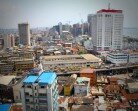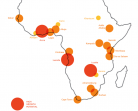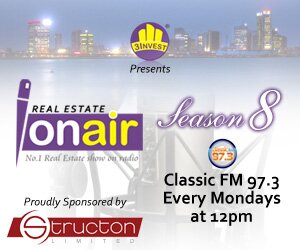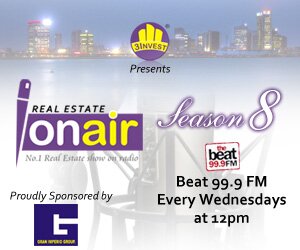Friday , 28 March 2014
Headlines
- Lekki-Ikoyi toll illegal court says
- New Lagos Computer Village requires 20 Billion Naira
- EHINGBETI 2014: Powering the Lagos Economy: Real Opportunities, Endless Possibilities
- Nigerian Economic Summit to focus on Education
- Construction of 2nd Niger Bridge kicks off
- Fraud Alert: Beware of Ayobo land – Lagos Land Bureau
- NIESV becomes govt official property valuers and managers – BPP
Nigerian Real Estate Report with a Special Focus on the Residential Sector November 2012

Executive Summary
Strong Investment Potential
Africa and the emerging markets present opportunities for healthy returns due to their increasing growth fundamentals. The eurozone crisis and slow down in growth, have weakened advanced economies from their strong position as an investment destination. Despite economic uncertainties, global real estate remains resilient as investors focus on promising markets, such as Africa.
The key drivers of success in African economies include increased political stability, and growing macroeconomic returns. However, many challenges still exist for African developers. A growing middle class and urbanization have driven demand for real estate in Nigeria. Unmet demand has increased the housing deficit to 16-18million units. Unfortunately, this deficit has not been properly addressed due to regulatory and structural deficiencies by the key regulators in the real estate industry in Nigeria.

African Overview
Growing fundamentals. Attractive returns.
Faced with low yield investment opportunities in other parts of the world, investors shift their attention to Africa. Research shows that this shift may be prolonged given the fundamentals of Africa’s growth beyond commodities. The continent is booming. With this growth, Africa’s cities are experiencing an influx of residents in search of work and better standards of living. By 2030, more than 50% of Africans will be living in cities. The city’s urban infrastructure is under more pressure to house a growing population, and provide better power, water, and sanitation. Africa’s growth presents investment opportunities in key sectors given the sheer size of the market and the continent’s potential.

Urbanized population (2000-2030; % of total pop.)
McKinsey estimates that by 2020, Africa’s collective GDP and consumer spending will be US$2.6 trillion and $1.4 trillion, respectively.
Office
»Shortage of Grade A office space
»Angola, Lagos, and Luanda among most expensive cities in the world to rent office space
»Market distortions from oil and gas industry tenants
»Average rentals: Grade A- $120/m²/yr to $2160/m²/yr; Grade B- $96/m²/yr to $1500/m²/yr
Hospitality
»As of 2010, industry estimated to be worth $49.9bn, with $203.7bn in untapped potential & $253.5bn market size
»Twenty hotel groups (with 34 brands) plan to add more than 30,000 rooms over the coming years
»Renewed growth of hospitality industry, especially in Sub-Saharan Africa
»UN-Habitat estimates 1.1 billion people live in inadequate conditions in urban areas
»72% of Sub-Saharan African population live in slum conditions
»West African housing deficit estimated at 30 million units
»Government driven initiatives focus on taxes, special incentives, and housing reform legislation
Residential
»Increasing demand for formal retail due to growing middle class
»Open spaces and local markets still prevalent
»Over 450,000m² of retail space expected in the next 24 months in Ghana, Kenya, Nigeria and South Africa
»Average rental of $30 to $100/m²/month
»Lease periods of 2 – 5 years

Nigerian Overview: Huge Potential
Huge Potential. Difficult Terrain.
Despite growth in the sector, there’s a huge demand/supply gap driven by a growing population, expanding middle class and rapid urbanization. For example, the World Bank projects that Nigeria needs to produce 720,000 units annually for the next 20 years to address the housing deficit1.

Annual Growth Rate of the Real Estate Sector

Various challenges prevent the optimal provision of real estate in Nigeria, such as legislative and financial issues – which have plagued the sector and are yet to be resolved. The onus is on the government to provide a better operating environment to encourage private sector participation. In particular, the Land Use Act presents a substantial hurdle.
The cost of construction in Nigeria is currently at least twice that of other African countries with the cost of cement and steel at least three times that of the United States.2 These are due in large part to a lack of industrialization and power.
Challenges to the optimal provision of real estate in Nigeria include legislation, bureaucracy, limited access to finance, high costs of construction, use of sub-optimal building materials, lack of oversight, political involvement, inconsistency in implementation, double taxation, lack of adequate statistical records, amongst others.

Nigerian Real Estate Sector Snapshot
Initiatives taken so far in the sector include the restructuring of the Federal Mortgage Bank of Nigeria (FMBN) and the passage of a bill by the Lagos State government establishing a mortgage board and scheme.
Some expert recommendations to grow the industry include dedicating a portion of the Sovereign Wealth Fund (SWF) to mortgages, fast tracking the amendment of the Land Use Act, reforming foreclosure laws, and providing tax rebates for local industries producing building materials.
Nigerian Overview: Housing Characteristics
A look at Household Amenities
The data analyzed below is drawn from the 2006 Population and Housing Census by the National Population Commission. In several ways, the Nigerian housing characteristics highlight some of the challenges the nation faces in its quest to join the world’s developed economies. Access to basic infrastructural services such as water and toilet facilities remains broadly limited. Various forms of households are recognized in the survey including regular and nomadic households. Regular households are defined as a person or group of persons living together usually under the same roof or in the same building/compound, who share the same source of food and recognize themselves as a social unit with a head of the household.


Nigerian Overview: Difficult Terrain
Huge Potential. Difficult Terrain
The growing middle class and urbanization trends that characterize the African continent are having an impact on the housing discussion in Nigeria. Africa’s second largest economy, with a population of 167 million and vast oil wealth continues to experience problems in meeting a housing deficit modestly estimated at 14 to 16 million. A brief look at the statistics paints a disappointing picture.
- More than 80 per cent of the Nigerian population lives in settlements that are unplanned with poor living conditions.
- Approximately 85 per cent of the urban population lives in rented accommodation – spending over 40 per cent of their income – which is well over the 30 per cent mark that separates “affordable” from cost burden.
- A closer look reveals that 90 per cent of houses are self-built, with less than 5 per cent in possession of formal title registration.
- Mortgage loans and advances stand at 0.5% to GDP in contrast to 30-40% in emerging economies and 60-80% in advanced economies.


Key Players in Real Estate
Agencies in need of support and reform
The real estate and housing sector in Nigeria is regulated primarily by the Federal Ministry of Lands, Housing and Urban Development, alongside the Central Bank and Securities and Exchange Commission, who provide financial oversight. The major legislation governing the real estate industry is the Land Use Act of 1978.
Professional bodies that also provide regulatory guidance include the Nigerian Institute of Estate Surveyors and Valuers (NIESV), Nigerian Institute of Architects (NIA), Nigerian Society of Engineers (NSE), and Nigerian Institute of Building (NIOB).

Real Estate Finance in Nigeria
Inadequate funds. Difficult to access
The Nigerian real estate finance market is structured along formal and informal sectors. The informal sector includes the rotational savings and loans associations, and family savings among others. The formal sector involves the mortgage finance segment.
This segment contributes less than 1% of GDP in contrast to emerging markets such as Malaysia (25%) and South Africa (29%)1. Major obstacles to mortgage finance include the dearth of long-term funds, absence of a secondary mortgage market, and the inadequate branch network of Primary Mortgage Institutions (PMIs), among others.

Opportunities in the Real Estate Space
Significant demand down the pyramid
Opportunities in Financing
Increasing population growth, rapid urbanization and the growth of the middle class have spurred demand for real estate, with the level of housing at only 2 dwelling units per thousand people compared to a rate of 8-10 dwelling units per thousand people as recommended by the United Nations. Nigeria has a population growth rate of 3% and a rural-urban migration rate of 5% per annum. The rate of housing demand continues to exceed supply, presenting ample opportunities for growth and development.
Opportunities in Real Estate Delivery
Based on the National Bureau of Statistics, 2007 and the Nigeria Living Standard Survey, 2004, the pyramid below attempts to categorize the housing finance requirements of certain income levels (by class).

The poor performance of current mortgage products is a result of high interest rates and unattractive products & services that fail to capture the needs of low and middle income earners. The upside potential rests in taking advantage of the increasing middle income spending power and the large low income market.

Key Challenges. Proposed Mitigants.
Government Inertia. Low Affordability.
Various challenges exist which prevent the optimal provision of real estate in Nigeria, especially housing for the low income segment. Such challenges consist of legislative, regulatory, financial, and political issues which have dogged the sector over time and are yet to be resolved.
To overcome these challenges, a review of current legislation is required, additional products needs to be introduced and the public educated on these products to bring about inclusion, sector growth and bridge the current housing deficit.


Key Figures on select African countries
Nigeria remains comparatively pricey
The tables below provide a comparison of some real estate statistics for Nigeria and a few other African economies. Across the board, the figures for Nigeria highlight that it is certainly not an inexpensive location to live or build property.
Table 2 provides a comparison of prime rents and yields. Luanda and Lagos live up to their ranking as some of the most expensive cities in the world, with prime residential rents of $20,000 and $11,500/m²/month respectively.

Comparisons of Prime Rents (US$ per sq m/month) and Prime Yields (%)


Directory of Property Development and Management Companies
|
COMPANY NAMES |
LOCATION |
|
Actis Real Estate (Laurus Development Partners) |
Maersk House, 121 Louis Solomon Close Victoria Island, Lagos |
|
ARM Properties Plc |
1 Mekuwen Road, off Oyinkan Drive, Ikoyi, Lagos |
|
Best Homes |
F8, Febson Mall, Plot 2425 Herbert Macaulay Way, Zone 4, Wuse District Abuja , |
|
Briscoe Properties Limited |
18 Fatai Atere Way Matori, Lagos |
|
Broll Property Services Limited |
The Octagon, 13A AJ Marinho Drive Victoria Island, Lagos |
|
Chagoury Group |
Plot 1684, Sanusi Fafunwa Street Victoria Island, Lagos |
|
Churchgate |
Churchgate Towers PC 30 Afribank Street Victoria Island, Lagos |
|
Cityscape International Limited |
5th Floor ICON House, Plot 999f Idejo Street, Victoria Island, Lagos |
|
City Planners Property and Investment Limited |
Suit 308, 2nd Floor, Allseasons Place, Beside FRSC, Ojodu-Berger, Lagos , 07 |
|
CMB Building Maintenance & Investment Co. Limited |
15BB Ojomu Road (formerly Ruxton) Ikoyi, Lagos , |
|
Cornerstone Construction |
3 Ope Oredugba Close, Off Mobolaji Bank Anthony Way, via Etiebet’s Place Ikeja, Lagos , |
|
Country Home Real Estate Company |
Wapic House, 119 Awolowo Road, Ikoyi , Lagos |
|
Crown Realties Plc |
3A Lalupon Close, Off Keffi Street, S.W. Ikoyi, Lagos -3, -8 |
|
Cubic Homes |
Plot 416 Idu Industrial Estate Area Phase 1, Abuja |
|
Denaro Properties Limited |
2 Tokunbo Alli Street, off Toyin Street, Ikeja, Lagos , |
|
Dudu Realties Associates |
15 Catholic Mission Street, 3rd Floor, Lagos Island, Lagos |
|
Efficacy Homes Limited |
5 Okoi Arikpo House Victoria Island, Lagos , |
||
|
Femab Property Nigeria Ltd |
Spring Bank Building, Pc 1 Engineering Close, Off Idowu Tailor Street, Victoria Island, Lagos , |
||
|
Godab Nigeria Limited |
2 Lake Street, off Gana Street, Maitama, Abuja , |
||
|
Grant Properties Limited |
Goshen Beach Estate, Abimbola House, Lekki Phase 1, Lagos |
||
|
IPDC Limited |
SPAACO House, Suite G03, 27A Macarthy Street Onikan, Lagos , |
||
|
J.S. Realty Co. |
Office Building 1, Fara Park Estate, Lekki Epe Expressway, Lagos , |
||
|
Latmor Construction Company |
Plot 933, Latmor Building, Abeokuta Road, Owode Apata, Ibada Southwest, Oyo State |
||
|
Leadmac Property & Development Company |
20 Adetokunbo Ademola Street, Victoria Island, Lagos |
||
|
Legacy Realties Limited |
7A, Akin Olugbade Street, Victoria Island, Lagos , |
||
|
Park Point Properties & Investment Limited |
Suite 44 Prime Shopping Plaza, 1 Muri Okunola Street, Victoria Island, Lagos , , |
||
|
Portal Realties Limited |
35 Allen Avenue, Ikeja, Lagos , |
||
|
Princely Estates Limited |
92A, Ojo Lane, Dolphin Estate Ikoyi, Lagos , |
||
|
Propertygate Development & Investment Plc |
8 Office Apartments, Rasheed Alaba Williams Street, Lekki Phase 1, Lagos , |
||
|
Property Mart |
Block 18, Plot 1B, Magodo GRA Shangisha, Lagos , |
||
|
Sim Properties & Homes Limited |
40 Asheik Jarma Way, off Mike Aishigbe Way, Jabi Abuja , |
||
|
Skyview Estates Limited |
Plot 262, Sapara Williams Close, off Idowu Martins Street, Victoria Island, Lagos -4 |
||
|
UACN Property Development Company Limited |
Niger House, 1-5 Odunlami Street, Lagos Island, Lagos , , |
||
|
Urban Shelter Limited |
Ist Floor Shippers Plaza, Plot 438 Michael Okpara Street, Wuse Zone 5, Abuja |
||
|
Wemabod Estates Limited |
5th Floor, Western House, 8-10 Broad Street, Lagos |
||
Tags
Related posts
-
Is the Tide Rising? World Economic Outlook ...
January 28, 2014
-
Lagos, Nigeria Real Estate Investment Report – ...
December 3, 2013
-
Africa Tourism Report 2013
October 11, 2013
-
World’s happiest nations are…
September 10, 2013
-
Mastercard African Cities Growth Index 2013
August 5, 2013
-
Castles mid year review of property prices
July 16, 2013
19 Comments
Leave a Comment
Real Estate on Air Season 8 EP3
Nigeria's First Syndicated Real Estate radio show on Classic FM 97.3
Multimedia
Multimedia
Poll
Login
- Lekki-Ikoyi toll illegal court says 3HAJONioIe via @3invest 10 hours ago
- Stakeholders discuss bridging Africa Infrastructure investment divide at AFC summit | BusinessDay: 1cgurgKWw9 11 hours ago
- New Lagos Computer Village requires 20 Billion Naira I3HZtkPKFO via @3invest 2014/03/25
- 6 nos 3 bedroom (65m) all ensuite with 1 room domestic quarters per condo/apr. Plus 2 nos 2 bed… JeahlSGNxx 2014/03/25
- EHINGBETI 2014: Powering the Lagos Economy: Real Opportunities, Endless Possibilities aCAHRegRuo via @3invest 2014/03/25















893006 620584Hello my family member! I wish to say that this post is remarkable, wonderful written and come with approximately all vital infos. I would like to see extra posts like this . 139850
595646 382507The the next occasion I read a weblog, I really hope so it doesnt disappoint me around brussels. Come on, man, Yes, it was my option to read, but I just thought youd have some thing interesting to state. All I hear can be a lot of whining about something that you could fix if you werent too busy searching for attention. 737276
581803 793201Whoa! This blog looks just like my old one! It
Hi! Someone in my Myspace group shared this
website with us so I came to check it out.
I’m definitely loving the information. I’m book-marking
and will be tweeting this to my followers! Exceptional blog and wonderful design.
275817 117541Howdy! I just want to give an enormous thumbs up for the excellent details you may have here on this post. I will likely be coming back to your weblog for a lot more soon. 717526
cetzIv Hey, thanks for the article post.Really looking forward to read more. Will read on…
567562 341519Sweet internet site, super style and style , genuinely clean and use friendly . 867764
I am so grateful for your blog.Really thank you! Really Great.
Awesome blog post.Really thank you! Great.
Thank you ever so for you blog article. Really Cool.
Looking forward to reading more. Great blog post.Really thank you! Great.
Awesome post.Really thank you! Keep writing.
wow, awesome article post. Will read on…
I really enjoy the blog article.Thanks Again. Will read on…
Really enjoyed this blog article.Much thanks again. Really Cool.
Appreciate you sharing, great blog post.Really thank you! Fantastic.
236026 2177Excellent read, I just passed this onto a colleague who was doing a little research on that. And he actually bought me lunch because I found it for him smile So let me rephrase that. 725368
Really informative blog article.
wow, awesome article.Really looking forward to read more. Cool.